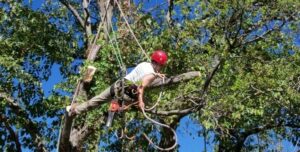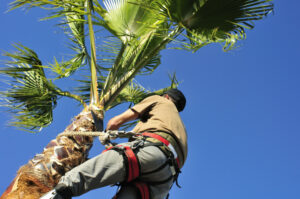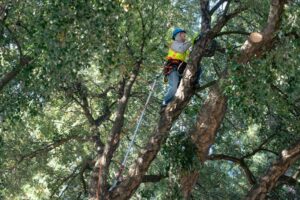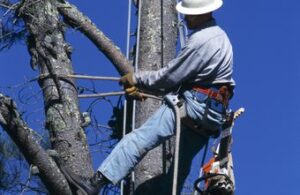 There is an old saying in the trades that goes something like this, “there is a high price to the low bid.” Unsuspecting homeowners and property managers who hire independent contractors who subsequently get injured on the property could potentially be liable for the injured person. California Labor Code Section 2750.5. Several factors determine the ultimate liability, but I imagine this fact situation will make several of you reading this think twice before you hire your next tree trimmer.
There is an old saying in the trades that goes something like this, “there is a high price to the low bid.” Unsuspecting homeowners and property managers who hire independent contractors who subsequently get injured on the property could potentially be liable for the injured person. California Labor Code Section 2750.5. Several factors determine the ultimate liability, but I imagine this fact situation will make several of you reading this think twice before you hire your next tree trimmer.

Who is a Contractor in California?
California Business and Professions Code Section 7026.1, states in pertinent part that a contractor includes any person who performs tree removal, tree pruning, stump removal, or engages in tree or limb cabling or guying. The term contractor does not include a person performing the activities of a nurseryperson who is the normal course of routine work performs incidental pruning of trees, or guying of planted trees and their limbs. The term contractor does not include a gardener who in the normal course of routine work performs incidental pruning of trees measuring less than 15 feet in height after planting.
When Gardeners are Required to be Licensed
Thus, a gardener becomes a contractor (whether licensed or not) if pruning trees 15 feet or taller; a licensed nurseryperson does not have the same height limitation, because of her or his presumed degree of expertise as reflected by the issuance of a California nursery license.
A close look at the statute distinguishes nurserypersons, who are licensed, and gardeners who are not licensed. A nurseryperson can perform work on any height tree, and activities include work incidental to pruning of trees, or guying of planted trees and their limbs. A gardener may perform work including pruning trees not more than 15 feet in height.
 Jones v. Sorenson 25 Cal. App. 5th 933 (2018) Facts
Jones v. Sorenson 25 Cal. App. 5th 933 (2018) Facts
Mr. Miranda, a gardener, was hired by his long-time customer Ms. Sorenson to trim and prune some trees on the Sorenson property. Miranda, not well adept at working on tall trees in-turn hired Ms. Jones, an unlicensed worker who had worked for Miranda from time-to-time and even at the Sorenson property several times in the past. During her work, at the direction of Sorenson and subsequently Miranda, Jones fell and was severely injured. Jones claimed that Miranda was negligent in the way he held or did not hold the ladder which subsequently teetered and fell. Because Miranda was an unlicensed gardener and was not properly licensed to trim trees greater than 15 feet tall Jones sued the property owner Sorenson. Jones’ theory was one of respondeat superior (Latin for ‘let the master answer’) or vicarious liability. Specifically, since Miranda was unlicensed Sorenson was de facto Miranda’s employer, and would be vicariously liable for Miranda’s negligence and responsible for Jones’ injuries.
As cleverly stated by our California Supreme Court, “It is doubtful the average homeowner realizes tree trimming can require a contractor’s license.” (Fernandez v. Lawson (2003) 31 Cal.4th 31, 37 (Fernandez).) But that is the case and each homeowner should be mindful of this fact. I would venture to guess at least 9 out of 10 gardeners do not know of this restriction on their unlicensed activities – next time you engage with your gardener ask if they are aware of this restriction on their activities.
 California Homeowners have Burden of Proof
California Homeowners have Burden of Proof
Unfortunately, in California homeowners have the burden to ensure contractors are properly licensed. California Labor Code creates a rebuttable presumption that an unlicensed person who performs for which a license is required is an employee and not an independent contractor. Unlicensed contractors can not purchase workers compensation insurance, thus any employees will be de facto uninsured employees. Thus, when a homeowner has a work being done at their property by an unlicensed individual – when the work requires a license – then the homeowner is potentially responsible for any and all injuries suffered by the unlicensed workers/employees.
 Protect Yourself by Simply Asking Questions or Gardeners Trimming 15′ Trees Expose Homeowners to Liability
Protect Yourself by Simply Asking Questions or Gardeners Trimming 15′ Trees Expose Homeowners to Liability
To eliminate this potential exposure California homeowners should simply perform the simple step of asking their contractors to produce their licenses and their insurance certificates. For property owners who own rental properties being managed by property managers or property management companies, this step should be automatic. If a property management company is in the habit of hiring unlicensed workers to perform work on the property to save money it may be time to look elsewhere. Contact Esquire Property Management Group where we always follow the law. Remember, there is a high price to the low bid.
David currently is the broker/owner of several real estate related businesses which manage and maintain 300+ client properties on the San Francisco Peninsula.
Trust, transparency, and performance guarantees are the foundation of these businesses. David challenges anyone to find a PM professional that offers services similar - extensive education, customer service, and performance guarantees.
David also provides consulting for his clients on property development feasibility, construction, and complex real estate transactions.
David has authored a published law review article, three real estate books, and over 150+ real estate blog articles.
- “Wildfires, Insurance & Mortgages: Will Your Home Survive the Financial Aftermath?” - March 3, 2025
- What’s Driving California’s Commercial Real Estate Shakeup? - February 27, 2025
- Critical Issues in Triple Net Leases Investors Should Know - February 14, 2025

